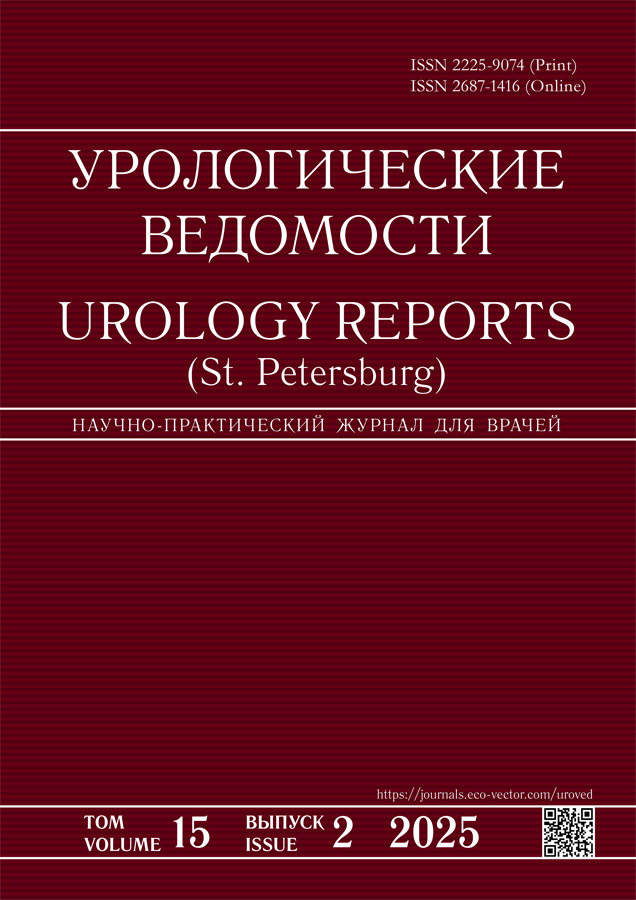Specific Features of Treatment of Intraoperative Ureteral Injuries Complicated by Peritonitis
- Authors: Shanava G.S.1,2, Mosoyan M.S.2,3, Sivakov A.A.1, Nikulin R.E.1, Putrenok D.G.4, Zakharova V.V.2
-
Affiliations:
- I.I. Dzhanelidze Saint Petersburg Institute of Emergency Care
- Almazov National Medical Research Centre
- Academician I.P. Pavlov First St. Petersburg State Medical University
- Municipal Polyclinic No. 38
- Issue: Vol 15, No 2 (2025)
- Pages: 159-164
- Section: Original study
- Submitted: 04.12.2024
- Accepted: 18.03.2025
- Published: 06.08.2025
- URL: https://journals.eco-vector.com/uroved/article/view/642564
- DOI: https://doi.org/10.17816/uroved642564
- EDN: https://elibrary.ru/UAWQXH
- ID: 642564
Cite item
Abstract
BACKGROUND: Ureteral injury is a rare condition, accounting for less than 3% of all urinary tract injuries. The majority of ureteral injuries are iatrogenic. Intraoperative ureteral injuries are identified late in 75% of cases, which leads to the development of post-traumatic complications. The timing of peritonitis manifestation after ureteral transection or thermal damage varies, affecting treatment strategy.
AIM: To determine the optimal treatment strategy for intraoperative ureteral injury complicated by urinary peritonitis.
METHODS: This retrospective study included 26 patients treated at the I.I. Dzhanelidze Research Institute of Emergency Medicine between 1998 and 2022 for intraoperative ureteral injury complicated by urinary peritonitis.
RESULTS: The median patient age was 51 years [Q1 41; Q3 66]. Among the surgical interventions leading to intraoperative ureteral injury, gynecological operations were the most common. The time to detection of urinary peritonitis ranged from 11 to 103 hours after the initial surgery. Urinary peritonitis was detected in the reactive phase in 8 patients, in the toxic phase in 6, and in the terminal phase in 12. Surgical treatment was performed in all cases of urinary peritonitis. Primary reconstructive surgery was performed in 13 (50%) patients. In 10 cases (38.5%), staged procedures were required before reconstructive ureteral surgery could be performed. In 3 patients (11.5%), reconstructive surgery was not carried out; instead, permanent drainage of the upper urinary tract using a nephrostomy was performed.
CONCLUSION: If intraoperative ureteral injury is identified during the reactive or toxic phase of urinary peritonitis, reconstructive surgery may be performed. In the terminal phase of peritonitis, only staged procedures aimed at draining the upper urinary tract should be performed.
Keywords
Full Text
About the authors
Gocha Sh. Shanava
I.I. Dzhanelidze Saint Petersburg Institute of Emergency Care; Almazov National Medical Research Centre
Email: dr.shanavag@mail.ru
ORCID iD: 0009-0006-2599-4023
SPIN-code: 1706-7410
MD, Cand. Sci. (Medicine)
Russian Federation, Saint Petersburg; Saint PetersburgMkrtich S. Mosoyan
Almazov National Medical Research Centre; Academician I.P. Pavlov First St. Petersburg State Medical University
Email: moso03@yandex.ru
ORCID iD: 0000-0003-0081-6985
SPIN-code: 5716-9089
MD, Dr. Sci. (Med.), Professor
Russian Federation, Saint Petersburg; Saint PetersburgAlexei A. Sivakov
I.I. Dzhanelidze Saint Petersburg Institute of Emergency Care
Email: alexei-sivakov@mail.ru
ORCID iD: 0009-0001-4504-7545
SPIN-code: 3064-8134
MD, Cand. Sci. (Medicine), Assistant Professor
Russian Federation, Saint PetersburgRoman E. Nikulin
I.I. Dzhanelidze Saint Petersburg Institute of Emergency Care
Email: nikulinre@ya.ru
ORCID iD: 0000-0001-8809-1389
SPIN-code: 1082-1328
Russian Federation, Saint Petersburg
Dariko G. Putrenok
Municipal Polyclinic No. 38
Email: petite_femme061294@mail.ru
ORCID iD: 0009-0005-1032-8354
Russian Federation, Saint Petersburg
Viktoria V. Zakharova
Almazov National Medical Research Centre
Author for correspondence.
Email: zakharovaviktoria2002@gmail.com
ORCID iD: 0009-0008-9234-4375
Russian Federation, Saint Petersburg
References
- Phillips B, Cortese F, Falco M, et al. Trauma to the bladder and ureter: a review of diagnosis, management, and prognosis. Eur J Trauma Emerg Surg. 2017;43(6):763–773. doi: 10.1007/s00068-017-0817-3 EDN: QEEECS
- Sahai A, Ali A, Barratt R, et al. British Association of Urological Surgeons (BAUS) consensus document: management of bladder and ureteric injury. BJU Int. 2021;128(5):539–547. doi: 10.1111/bju.15404 EDN: VAMZWY
- Cassell Iii AK, Manobah B. Management of genitourinary trauma — current evaluation from the Sub-Saharan region: A systematic review. World J Crit Care Med. 2021;10(6):377–389. doi: 10.5492/wjccm.v10.i6.377 EDN: KPUIRJ
- Siram SM, Anju J, Nahar A, et al. Ureteral trauma: patterns and mechanisms of injury of an uncommon condition. Am J Surg. 2010;199(4):566–570. doi: 10.1016/j.amjsurg.2009.11.001
- Leite CC, Guerreiro N, Camerin GR, et al. A practical guide to genitourinary trauma. Radio Graphics. 2021;41(1):96–97. doi: 10.1148/rg.2021200110 EDN: DPRNRF
- Li X, Yang K, Ding G, et al. Etiology, characteristics and management of ureteric injury: experience from a nationwide study. Transl Androl Urol. 2022;11(6):794–802. doi: 10.21037/tau-21-998 EDN: LBHYYP
- Smith AP, Bazinet A, Liberman D. Iatrogenic ureteral injury after gynecological surgery. Can Urol Assoc J. 2019;13(6 Suppl4):S51–S55. doi: 10.5489/cuaj.5936
- Shirshov VN, Doronchuk DN, Shatirishvili OK, et al. Experience in the treatment of iatrogenic damage of the ureters. Clinical Practice. 2016;(1):3–10. doi: 10.17816/clinpract713-10 EDN: YUAQSV
- Vorobev V, Beloborodov V, Golub I, et al. Urinary system iatrogenic injuries: Problem review. Urol Int. 2021;105(5–6):460–469. doi: 10.1159/000512882 EDN: IOFFZI
- Ray VIP, Sánchez JAS, Mendoza IKM, et al. Comprehensive analysis of ureter injuries: A systematic review of the medical literature. Int J Med Sci Clin Res Stud. 2023;3(8):1623–1628. doi: 10.47191/ijmscrs/v3-i8-/34 EDN: DMJBBR
- Gild P, Kluth LA, Vetterlein MW, et al. Adult iatrogenic ureteral injury and stricture-incidence and treatment strategies. Asian J Urol. 2018;5(2):101–106. doi: 10.1016/j.ajur.2018.02.003
- Ding G, Li X, Fang D, et al. Etiology and ureteral reconstruction strategy for iatrogenic ureteral injuries: A retrospective single-center experience. Urol Int. 2021;105(5–6):470–476. doi: 10.1159/000511141 EDN: CIYUZW
- Cebeci OO. Is endourological intervention a suitable treatment option in the management of iatrogenic thermal ureteral injury? A contemporary case series. BMC Urol. 2022;22(1):137. doi: 10.1186/s12894-022-01094-5 EDN: RAAFDT
- Limbachiya D, Tiwari R, Kumari R. Iatrogenic thermal energy-induced distal ureteric injury and its management by laparoscopy ureteroureterostomy. JSLS. 2023;27(3):e2023.00030. doi: 10.4293/JSLS.2023.00030 EDN: NCINTO
Supplementary files








